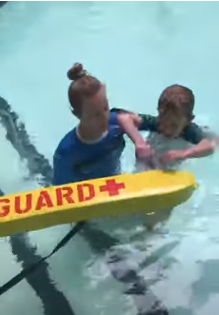Empowering Special Needs Children: The Significance of Introducing Rescue Equipment in Swimming Lessons
Swimming is a life skill that holds immense importance for people of all ages and abilities. It not only promotes physical health but also fosters water safety awareness, confidence, and personal growth. When it comes to special needs children, the benefits of learning to swim are even more pronounced, as swimming can enhance their motor skills, coordination, social interactions, and overall well-being. In this context, introducing rescue equipment in swimming lessons for special needs children takes on a profound significance. It not only ensures their safety but also empowers them with a sense of control and confidence, creating a transformative and inclusive learning experience.
 |
| Teaching Safety Equipment |
Enhancing Safety
Safety is paramount, especially when it comes to individuals with special needs. Water-related activities carry inherent risks, and it is crucial to minimize these risks through proper safety measures. Incorporating rescue equipment, such as life jackets, rescue tubes, and reaching poles, into swimming lessons provides an extra layer of safety for special needs children. This equipment acts as a safety net, enabling instructors to swiftly respond to any unforeseen situations and ensuring that children remain buoyant and supported in the water.
Building Confidence and Independence
For special needs children, every achievement, no matter how small, contributes to building their confidence and sense of independence. Familiarizing these young learners with rescue equipment instills a sense of empowerment, as they realize they can rely on these tools if needed. This newfound assurance extends beyond the pool, translating into increased self-confidence and a willingness to explore new experiences outside of their comfort zones.
Promoting Inclusivity and Acceptance
Inclusion is at the heart of effective education. By introducing rescue equipment in swimming lessons, instructors send a powerful message of inclusivity and acceptance to special needs children. This action highlights that their needs and safety are valued, fostering a sense of belonging and reducing any feelings of isolation. As these children interact with their peers, who may not have special needs, through shared experiences involving rescue equipment, friendships are nurtured, and barriers are broken down.
Teaching Practical Water Rescue Skills
Swimming lessons that incorporate rescue equipment provide an opportunity to teach practical water rescue skills to special needs children. While the primary focus is on their safety, understanding how to use rescue equipment effectively can empower these children to potentially assist others in need. Learning how to use reaching poles, throwing rescue devices, and cooperating with rescuers helps develop a sense of responsibility and empathy, qualities that extend beyond the pool environment.
Facilitating Parental Peace of Mind
For parents of special needs children, every step towards independence is met with a mix of pride and concern. Introducing rescue equipment in swimming lessons provides parents with a sense of reassurance, knowing that their children are being equipped with the skills and tools to stay safe in and around water. This peace of mind allows parents to support their children's aquatic endeavors with confidence, fostering a positive and supportive learning atmosphere.
Conclusion
Incorporating rescue equipment into swimming lessons for special needs children is not just about safety; it's about fostering an environment of empowerment, inclusivity, and growth. By familiarizing these young learners with rescue equipment, swimming instructors provide them with valuable tools that extend beyond the pool, shaping their confidence, independence, and social interactions. As special needs children develop practical water rescue skills and embrace a newfound sense of security, they embark on a journey of personal transformation, supported by the knowledge that they can navigate water-related situations with poise and competence.
Enjoy
Richard








No comments:
Post a Comment